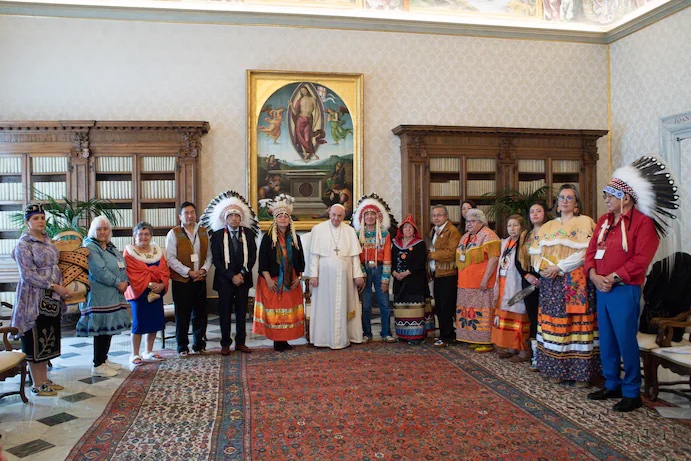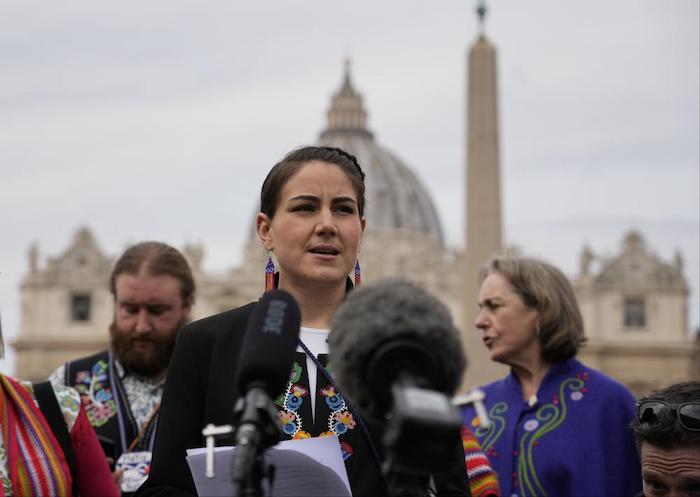How the Catholic Church has changed its tone
By Brittany Hobson
First Nations, Inuit and Metis residential school survivors, knowledge keepers, elders, and youth have wrapped up meetings with Pope Francis at the Vatican with an historic apology.
The delegation was there to renew calls for the Pope to apologize for the Roman Catholic Church’s role in residential schools.
On Friday, the Pope said: “I am very sorry.” He also said he will come to Canada, but a date has not been set.
The Truth and Reconciliation Commission released its 94 calls to action in 2015. Among them was a request for an apology from the Pope and for the apology to take place in Canada within one year of the release of the report.
A number of individual Catholic organizations, parishes and bishops have apologized to Indigenous children and their families for the spiritual, cultural, emotional, physical and sexual abuse the church inflicted on youngsters forced to attend the schools. One of the most recent apologies was issued last September by the Canadian Conference of Catholic Bishops.
A previous pope expressed “sorrow”
A common argument for why it took so long for an apology is that the issue was already addressed, say some experts.
In 2009, a small delegation led by Phil Fontaine, former national chief of the Assembly of First Nations, met with former pope Benedict to discuss the abuse and trauma at residential schools with the hope of securing an apology. Benedict expressed “sorrow” for what happened but did not apologize.
Christopher Hrynkow, a professor in the department of religion and culture at St. Thomas Moore College in Saskatoon, says some in the Catholic community saw this as enough of an apology. But he says the TRC asked for something different.
“Everybody understands the importance of the Pope in Catholic culture and what he represents,” Hrynkow says.
He adds some believe that because religious organizations had entered into a partnership with Canada, an apology rested with those specific groups and not with the corporate Catholic Church.

Jeremy Bergen calls previous statements from the church “wishy-washy,” because they didn’t fully acknowledge the church’s role in the schools.
“They’re sorry bad things happen but they don’t say what everyone’s kind of thinking: the church did it,” says Bergen, an associate professor of religious studies and theological studies at Conrad Grebel University College in Ontario.
In 2019, Pope Francis convened a summit on sexual abuse within the Catholic Church. At the time, church higher-ups from around the world apologized to survivors of clergy abuse.
Massimo Faggioli, professor of historical theology at Villanova University in Philadelphia, says he believes some in the Vatican perceived this “sealed the deal” for an apology.
The Church’s language
Apologies from the church are relatively new, says Faggioli. The decision to issue apologies started roughly 40 years ago when former pope John Paul II began his reign.
Bergen says apologetic language is not something churches are comfortable with.
In past years, church statements have used terms such as “repent, confess, or ask pardon or forgiveness,” says Bergen.
He says the Catholic Church needs to learn to speak a new language in order to better communicate with those who have been harmed by its actions. This includes words that make it clear what the wrong was, who did the wrong, and who’s responsible for it.
Support from bishops
Canadian bishops have been divided over the need for an apology from the Pope, says Joe Gunn, executive director for Centre Oblat – A Voice for Justice in Ottawa.
Pope Francis has led with the idea of a more consultative church. And Hrynkow says a commitment to visit Canada would have previously been met with hesitation from the Pope without a direct invitation from bishops.
The request from Canadian bishops had to be there and it wasn’t, says Gunn, who used to work with the Canadian Conference of Catholic Bishops.
That changed last year with the discovery of unmarked graves at former residential school sites across the country.

“Now all of the bishops of Canada are saying, ‘You know what? It’s a really good idea for him to come here. He should visit. This is what needs to be done,’” says Gunn.
Coming to Canada
Had the Pope waited to apologize in Canada, it would have been a first of its kind, says Faggioli.
Never before has a papal visit been built around the issue of abuse, he says. Previous apologies have been made during papal trips but those were done behind closed doors or last minute.
Delegates at the Vatican say they still expect a more fulsome apology will come from the Pope when he’s on Canadian soil.
“The Canadian case is a big test because it’s new,” says Faggioli. “It’s no longer the sexual abuse against minors itself. But it’s a history of abuse that is sexual, cultural, civilizational, national (and) it’s educational.
“It is much bigger.”

Complete Article ↪HERE↩!





